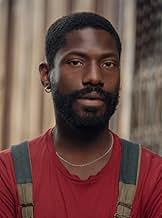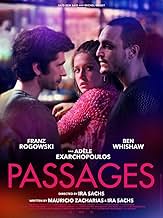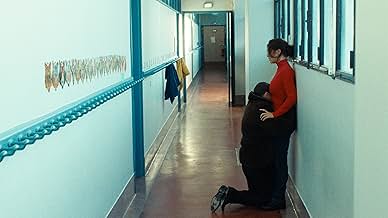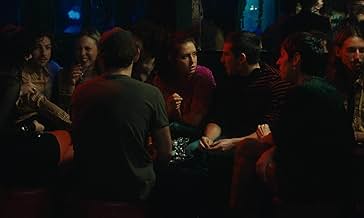IMDb-BEWERTUNG
6,6/10
13.798
IHRE BEWERTUNG
Es geht um zwei Männer, die seit fünfzehn Jahren zusammen sind und was passiert, wenn einer von ihnen eine Affäre mit einer Frau hat.Es geht um zwei Männer, die seit fünfzehn Jahren zusammen sind und was passiert, wenn einer von ihnen eine Affäre mit einer Frau hat.Es geht um zwei Männer, die seit fünfzehn Jahren zusammen sind und was passiert, wenn einer von ihnen eine Affäre mit einer Frau hat.
- Regie
- Drehbuch
- Hauptbesetzung
- Auszeichnungen
- 4 Gewinne & 26 Nominierungen insgesamt
Thibault Carterot
- Thibault
- (as Thibaut Carterot)
Theo Gabilloux
- Young Actor
- (as Théo Gabilloux)
Empfohlene Bewertungen
"Tomas" (Franz Rogowski) and husband "Martin" (Ben Whishaw) find their marriage severley tested when the former man starts to fall for "Agathe" (Adèle Exarchopoulos) and that passion drives "Martin" into the arms of "Amad" (Erwan Kepoa Falé). What now ensues is, frankly, a rather dull introspective of characters that didn't really leap off the screen at me. Rogowski can be a charismatic actor, but here he offers us a rather unremarkable characterisation of a horny man who wants to have his cake and eat it. Whishaw is, routinely these days on screen, just a bit weedy and presents another weakly constructed individual who seems content not to fight for the man he's supposed to love. It all just rolls along without really catching fire, it's over-scripted and though it may well have a visual authenticity to it, it's all just a bit so what? The production and pacing all contribute to the general ennui of the film and to be honest, I was just a bit disappointed with this whole thing. I saw it at the cinema this week, but I suspect even the most ardent fans of these three can wait for a television screening.
Who knows what routes were taken to be you, the entrances and doorways you've passed through, the aisles and the channels, the thoroughfares you've unravelled, the barriers you've broken and forced through. As you begin a fresh departure from your husband, deploying all your tools, with a brand new hand, falling for French girl Agathe, trying on restyled hat, nipping back to make sure flames are truly fanned. As the music stops you look for a new chair, continuing with conflict and despair, like a ball (a pair even) you bounce around, a kind of yo-yo is unwound, until you're snookered and then left, to go nowhere.
This movie's faint appeal as a post-modern take on a love triangle seems exhausted by the implausible image, featured in many promotional cards, of Franz Rogowski's sneering Tomas jazz-snuggling up to Adèle Exarchopoulos' Agathe on a dance floor. Tantalizing, but no, the film does not explain how this pair makes any chemical, emotional, or even symbolic sense. Franz Rogowski has a convincing restraint and charisma as an outsider in films like "In den Gängen" or "Transit," but here, cast in a sexual melodrama (between characters Tomas, Martin, and Agathe) as a self-obsessed bourgeois, he acts as if he were a guy who manages a cable company by day and was hired for this film because of his eyebrows. That said, Rogowski has little in the script to work with: why any character should care about this selfish oaf is head-ache-making opaque. The script tempts Rogowski into an egotistical flatness, his voice a monotonous whine, whose musical equivalent is a beginner's huffing atonally on a saxophone, alone. The character knows no boundaries. Part demon-child, part mindless fungus, he one minute halts ordinary conversations imperiously and the next shows up uninvited (opening doors himself), babbling needy demands in somebody's dwelling or workplace. Aiming for the top edge of the goal, the filmmakers instead deliver Tomas as a kind of compound of all the silly-shirt, night-scene poseurs in the history of Saturday Night Live, going back to Dan Ackroyd's "wild and crazy guy," Bill Hader's Stefon, and the Roxbury Guys of Ferrell and Kattan. However, Tomas's nylon tank and midriff-baring macrame-top collection beats all of these SNL figures in a race to "ridiculous." We are supposed to believe that a woman, played by Adèle Exarchopoulos, who recalls Monica Vitti and Anna Karina in her voluptuous elegance, toughness, and vulnerability, is obsessed with a sniveling, narcissistic twit, a dying fire-pit of acrid banalities. Unsurprisingly, after about five minutes of film time, Exarchopoulos resonates an odd fatigue incompatible with Agathe's allegedly incandescent fascination with Tomas, and she betrays a glowing concern that the actress, not the character, is in a bad dream: this movie. Ben Whishaw as Martin is such a maestro that he is the only one of the three (in other work excellent) principal actors who can bring himself fully to the script with a believable, developing, pained realization, but the film at large is so full of abrupt, nonsensical leaps of mood and commitment that the whole exercise could be a workshop in which the players were challenged to vitalize premises that make scant sense. Another film that much more convincingly allows the wonderful Adèle Exarchopoulos to play on a plane of "nothing left to lose" is Rien à foutre (2021).
"Passages" is a master class in building a film around an unlikable character.
Franz Rogowski gives a commanding performance full of charisma and sex appeal as a sexually fluid narcissist who can't stand to let anyone around him be happy without him (or even really with him, for that matter). Viewed with a live audience, the movie becomes almost something of a comedy, and it was a hoot hearing the people in the theater with me reacting with more and more vocal disbelief at just what a jerk this main character could be. It's a morbidly fascinating character study -- it's almost like watching a day in the life of a sociopath.
I should have been exasperated with this character and movie and probably would have been if it had been handled differently. But as is, with Ira Sachs's excellent direction and the film's terrific acting, it's instead one of the best movies I've seen so far this year.
Grade: A.
Franz Rogowski gives a commanding performance full of charisma and sex appeal as a sexually fluid narcissist who can't stand to let anyone around him be happy without him (or even really with him, for that matter). Viewed with a live audience, the movie becomes almost something of a comedy, and it was a hoot hearing the people in the theater with me reacting with more and more vocal disbelief at just what a jerk this main character could be. It's a morbidly fascinating character study -- it's almost like watching a day in the life of a sociopath.
I should have been exasperated with this character and movie and probably would have been if it had been handled differently. But as is, with Ira Sachs's excellent direction and the film's terrific acting, it's instead one of the best movies I've seen so far this year.
Grade: A.
Not all films need to be message driven, but I think any director or writer makes a film because they have something to say. In that sense, I'm not sure what 'Passages' wanted to say.
There was an ample potential to make an interesting social cut in the age of more fluid sexuality. "don't pigeon-hall yourself", "follow your heart"", you could be anything and love anybody"... and so on all sound great, but how it actually works in reality, and how it could clash with the traditional idea of a committed relationship, gender roles, and responsibility of a parenthood. There still are remnants of such questions and reflections in 'Passages'. Problem is Tomas is too big a rotten character and consumes all the drama. He's self absorbed (resulting in being selfish even without a malicious intend), cowardly, dishonest with himself and others, emotionally needy yet wants to dominate the situation, and above all manipulative (oh, and his fashion sense is pretty atrocious, but that's just based on my taste). It makes in contrast his male and female partners innocent victims, leaving very little room for a balanced reflection on sexuality/relationship/gender role issues.
Maybe a social commentary was not the director's intention. Maybe a character study was the goal? But surprisingly we don't really get to see the depth of Tomas and even less of Martin and Agathe. Why is Tomas the way he is? What was Tomas's relationship with Martin like before the storm? What did Tomas really see in Agathe and the future with her?
All the sex scenes were fun to watch, but if a character study was the goal maybe the film could have used those minutes more towards... well, to show the character. 'A rotten character ruins the lives of others' is too obvious a conclusion for a character study or even just any old relationship drama.
Passages is an OK drama. Technically sufficient and actings are decent (though I think it failed to utilize all the potential of such interesting actors as Whishaw and Rogowski). But it left me wondering what it really was all for... or is it just me out of my depth?
There was an ample potential to make an interesting social cut in the age of more fluid sexuality. "don't pigeon-hall yourself", "follow your heart"", you could be anything and love anybody"... and so on all sound great, but how it actually works in reality, and how it could clash with the traditional idea of a committed relationship, gender roles, and responsibility of a parenthood. There still are remnants of such questions and reflections in 'Passages'. Problem is Tomas is too big a rotten character and consumes all the drama. He's self absorbed (resulting in being selfish even without a malicious intend), cowardly, dishonest with himself and others, emotionally needy yet wants to dominate the situation, and above all manipulative (oh, and his fashion sense is pretty atrocious, but that's just based on my taste). It makes in contrast his male and female partners innocent victims, leaving very little room for a balanced reflection on sexuality/relationship/gender role issues.
Maybe a social commentary was not the director's intention. Maybe a character study was the goal? But surprisingly we don't really get to see the depth of Tomas and even less of Martin and Agathe. Why is Tomas the way he is? What was Tomas's relationship with Martin like before the storm? What did Tomas really see in Agathe and the future with her?
All the sex scenes were fun to watch, but if a character study was the goal maybe the film could have used those minutes more towards... well, to show the character. 'A rotten character ruins the lives of others' is too obvious a conclusion for a character study or even just any old relationship drama.
Passages is an OK drama. Technically sufficient and actings are decent (though I think it failed to utilize all the potential of such interesting actors as Whishaw and Rogowski). But it left me wondering what it really was all for... or is it just me out of my depth?
Wusstest du schon
- WissenswertesThe film was rejected by both the Cannes Film Festival and the Venice Film Festival. It ended up having its world premiere at the Sundance Film Festival 2023.
- Zitate
Tomas Freiburg: Martin!
Martin: Uh-huh?
Tomas Freiburg: Agathe is pregnant.
Martin: Did you sleep with me to tell me that?
- SoundtracksWon't You Buy My Sweet Blooming Lavender
Written by Janet Penfold
Performed by Janet Penfold (uncredited)
Also performed by Franz Rogowski (uncredited)
Top-Auswahl
Melde dich zum Bewerten an und greife auf die Watchlist für personalisierte Empfehlungen zu.
- How long is Passages?Powered by Alexa
Details
Box Office
- Bruttoertrag in den USA und Kanada
- 551.611 $
- Eröffnungswochenende in den USA und in Kanada
- 63.277 $
- 6. Aug. 2023
- Weltweiter Bruttoertrag
- 1.116.810 $
- Laufzeit1 Stunde 31 Minuten
- Farbe
- Seitenverhältnis
- 1.66 : 1
Zu dieser Seite beitragen
Bearbeitung vorschlagen oder fehlenden Inhalt hinzufügen

































